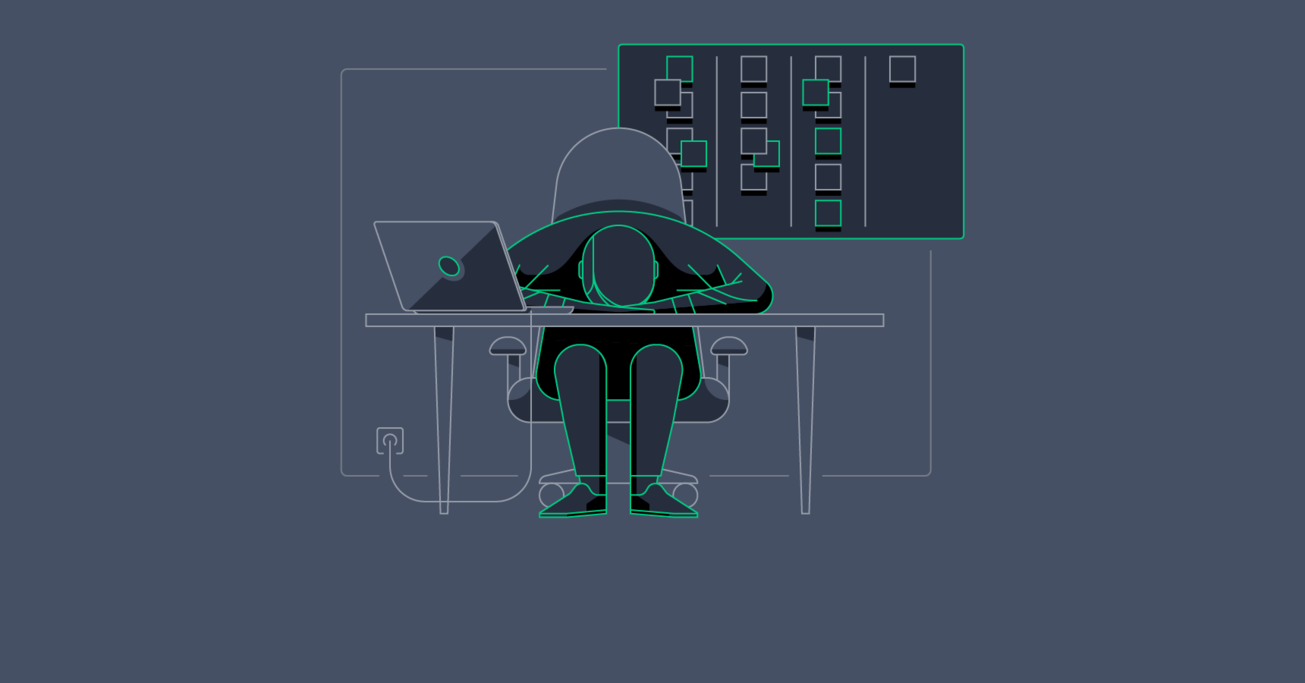Things to Watch Out for While Working Remotely
Remote jobs can be good for you, but depending on your character, they can also have some unpleasant side effects. Burnout affects people in all walks of life and in all industries, so what makes remote workers different?
Recognizing burnout symptoms early is of vital importance, and I cannot stress this enough. The deeper you sink into it, the longer it will take to recover, it’s as simple as that.
Remote jobs can be good for you, but depending on your character, they can also have some unpleasant side effects. Burnout affects people in all walks of life and in all industries, so what makes remote workers different?
Recognizing burnout symptoms early is of vital importance, and I cannot stress this enough. The deeper you sink into it, the longer it will take to recover, it’s as simple as that.

Nermin Hajdarbegovic
As a veteran tech writer, Nermin helped create online publications covering everything from the semiconductor industry to cryptocurrency.
Expertise
Over the past several months, we’ve published a number of lifestyle posts encouraging people to try working remotely, or even to embrace a nomadic lifestyle. We are a distributed team, and our day-to-day operations involve a lot of online communication between people in different time zones, working from home offices, co-working spaces, or holiday spots. We’re living proof that remote work, for lack of a better word, works.
Rather than being less productive, researchers have found that most remote workers are more productive than their office counterparts. Remote workers have to deal with fewer distractions, have flexible working hours, waste less time commuting and getting ready for work. No traffic jams, no office dramas, and on the face of it, not a lot of stress. However, they are still prone to burnout.
Years ago, I saw a clever ad for a savings scheme for young families. It showed toddlers playing at home, with a simple (and true) caption that went something like this: The job they will be doing when they grow up hasn’t been invented yet. At the time, I was dabbling in 3D graphics, a concept I didn’t even bother trying to explain to my parents, born in the 1940s. I was born at a time when computers were already showing up in homes and offices, and when space flight was looked upon as routine (until the Challenger disaster). My dad, on the other hand, was born before the advent of the first digital computer, when the only objects piercing our stratosphere were V2s raining down on London and Antwerp.
But here’s the thing: The world around us was not created by our generation; it was created by their generation. That’s why remote work felt a bit odd when I first gave it a go in 2007. A lot of things were missing, and a lot of people thought I was weird for not taking an office job, suit and tie included. It can still feel weird from time to time, but that has nothing to do with the infrastructure, or the work itself. It has more to do with the way I organise my time and go about my daily routine, and it has a lot to do with the human psyche.
Remote jobs can be good for you, but depending on your character, they can also have some unpleasant side-effects. This is what I intend to discuss today: stress, burnout, anxiety, caffeine, alcohol, nicotine, and more: the dark side of remote working.
I have no medical training, so I can only offer a few words of advice based on my personal experience. If you feel like you could use some proper help, you should get in touch with colleagues, friends, and your doctor.
Let’s start by taking a look at what makes remote workers prone to burnout, and why it matters.
Home Is Where the Broadband Is
Remote workers can turn just about any spot into an office. Whether it’s taking conference calls in a parked car or from a beach café, we can make it work. Our office is in the cloud, not in our dad’s office building.
This is, of course, the most attractive thing about working remotely. You can work while traveling the world, visiting your folks, skiing, island-hopping in the Aegean and Adriatic, or just get up in the morning and start working in your pyjamas at home. Sounds stress-free, right?
Wrong.
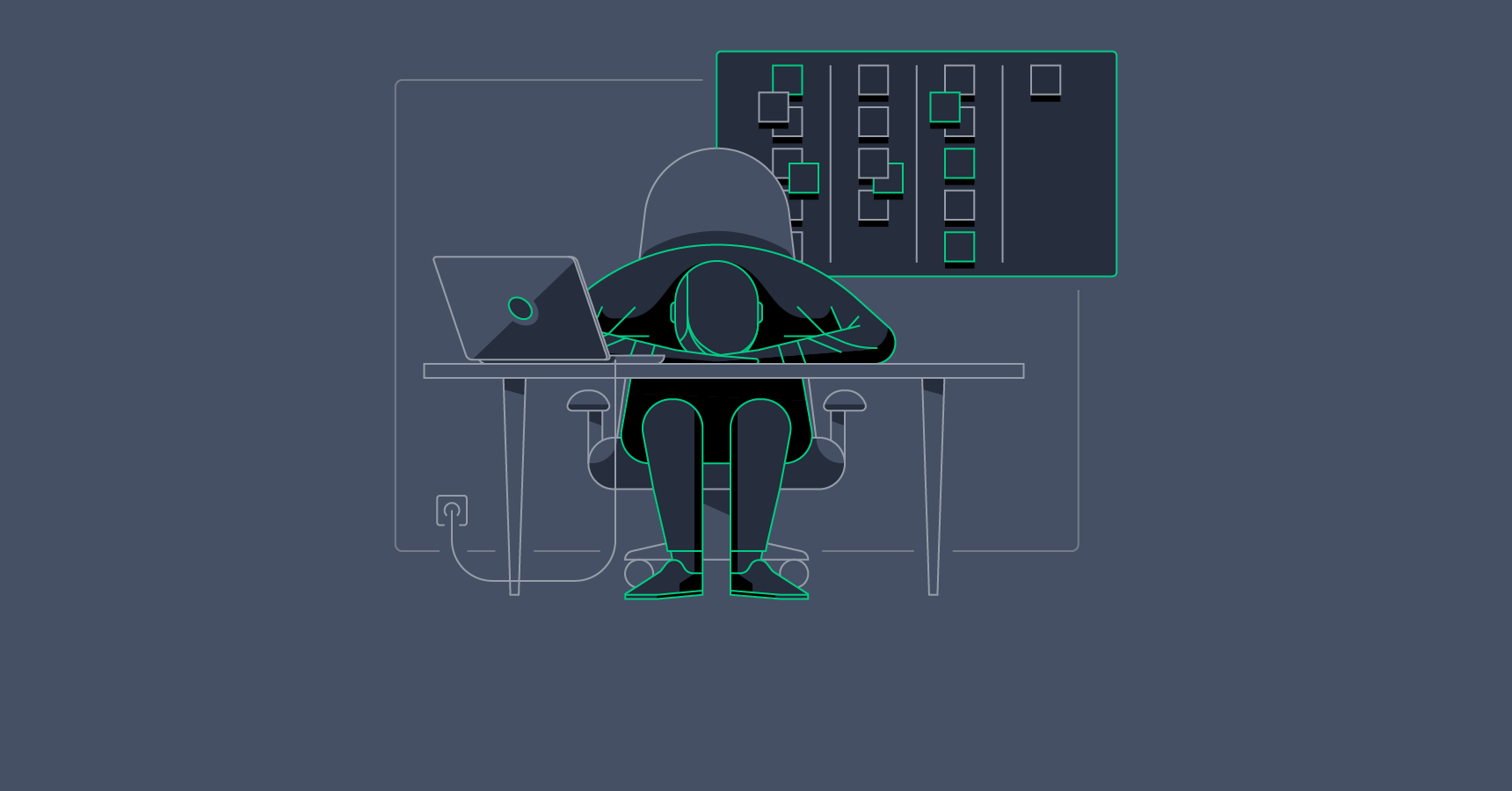
If you’re nomadic, bear in mind that travel can be stressful without the added burden of having to think about work at airport terminals, or break out your laptop on a train. Seeing some nice scenery and touring picturesque cities might be fun, but it’s also a distraction. Besides, the human mind is wired to adapt to just about anything. As you keep moving, the buzz you get from travelling to a new place starts to fade, but travel-induced stress does not. You can experience burnout on the road as well.
It is also important to distinguish between hard-core nomads and people who just like to extend their holidays by a few weeks. The latter still have a home to come back to. If you spend a few years on the road, sooner or later you’ll start to detach from old friends and lose the familiarity and certainty of home. Basically, you can turn any place into your home, but at some point you won’t feel at home anywhere.
Being able to rely on a social safety net, trusted friends and family, is important. Things go wrong, and when they do, it’s good to have someone around. Being on your own can be relaxing, as long as you don’t overdo it. Eventually, people tend to settle down, start a family, and play with their offspring; you know, those little bundles of joy that will apply for the jobs we are inventing today.
So, where does this leave us? Wait a minute, wasn’t remote work supposed to be good for you? What could possibly go wrong?
Burned Out and Bummed Out
Remember that detail about remote workers being more productive than their office counterparts? There is a price to pay for that extra productivity. Remote workers don’t get a chance to spend time chatting with their co-workers at the watercooler, or grab a sandwich at the local café. They don’t go out to lunch with their colleagues, either, and they don’t head out for a beer or glass of wine after work.
Workplace bonding is good, and I must note that I met many of my closest friends through work, which is next to impossible on a remote gig. That seemingly useless office chitchat is good for you; you are forced to take a break and interact with other people. However, if you are a remote workaholic, you can get up in the morning, start working, and utter your first words of the day when you go out for lunch, or worse, order takeout.
So, there is no commute, no office gossip, no coffee or lunch breaks with your teammates, and next to no human interaction. This could be a disastrous combination if you are prone to burnout. You’ll end up pushing yourself harder than you should, and since there’s nobody around to notice that you could use a break, chances are you won’t figure it out until it’s too late. It happened to me and, it could happen to you. If you think it can’t, if you think you’re tough, consider this: I spent three years of my life in a warzone, only to experience burnout in my cosy home office.
You see, collaboration technology is making remote teams more efficient and productive, but the human body is the weakest link in a distributed workforce infrastructure. Routers, servers, fiber-optic cables, processors and RAM don’t experience burnout, but people do.
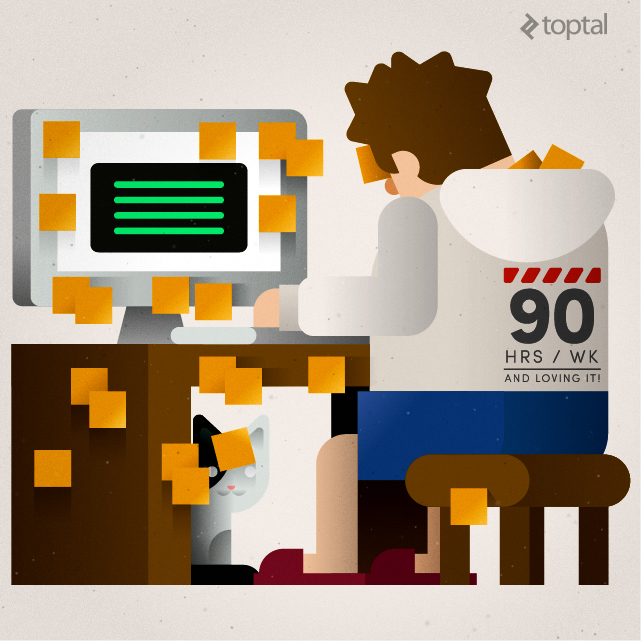
Ambitious freelancers, which I like to think most Toptal members are, can be too dedicated. They want to prove themselves, they stride to be more productive than the next guy, and they aim for excellence. They can stack up man-hours like there’s no tomorrow. To some extent, the industry culture encourages such behaviour. Pulling an all-nighter to hit a hard deadline, sipping energy drinks to stay awake, then unwinding with a booze binge: anything goes in our fast-paced industry. I’ve witnessed cool-headed and experienced professionals break down halfway through a project because they pushed themselves too hard, develop a range of health problems, ranging from weight gain to substance abuse. Burnout can break almost anyone.
Remember, if you mess up your professional or private life, you can bounce back. If you mess up your health, it’s much harder, and sometimes impossible. Plus, if you don’t care about health, you also run the risk of destroying your career and personal life in a single blow.
A close friend of mine, for instance, ditched his job three years ago and decided to start a healthy lifestyle. At the time he was a consultant for a major tech firm, but being a workaholic, the six-figure job took a toll on his health. He gained a lot of weight, stopped exercising, and started smoking (again).
One day, I ditched work so we could hit the slopes for some morning skiing, just like the good old days. Glancing at the cloudless winter sky, crisscrossed by shimmering contrails, he said, “There’s gotta be a consultant like me on one of those planes, heading to a new job. Boy, am I glad I’m not that poor bastard!”
Over the next two years, he managed to lose loads of weight (about 35kg/70lbs), drop a number of unhealthy habits, and brush up on his professional skills. Earlier this year, he got an even better gig, so the two-year hiatus obviously worked for him. Not only did he get his health back, but he is better off from a professional and financial perspective.
Burnout Symptoms
That may be a drastic example, and I hope it will not encourage any Toptalers to take a two-year leave of absence if they experience their first case of burnout. However, even two weeks can make a big difference, provided you catch the symptoms of burnout early.
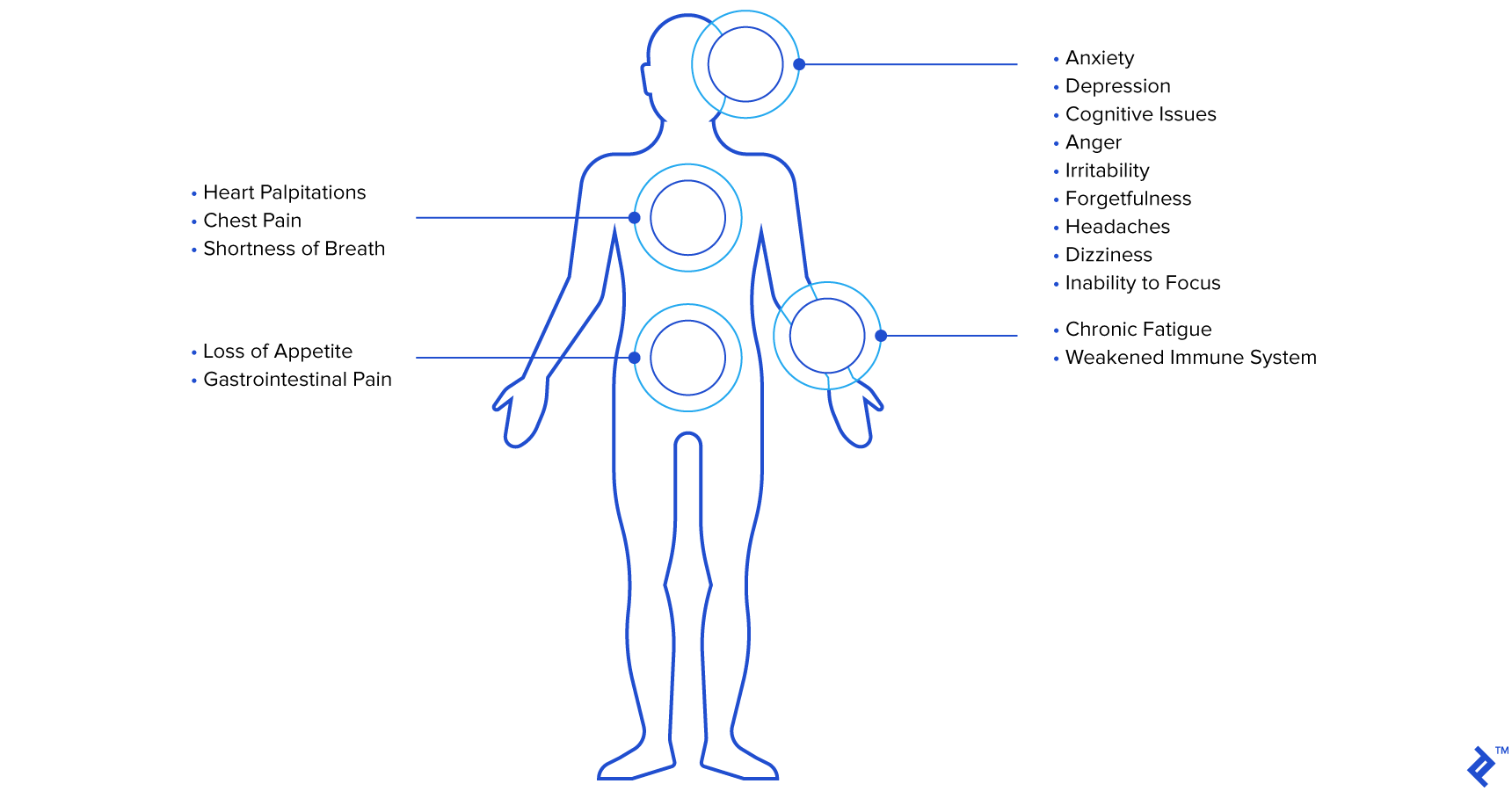
Here are some of the most common burnout symptoms:
- Anxiety and depression
- Chronic fatigue
- Insomnia
- Anger and irritability
- Wide range of physical symptoms, such as indigestion, headaches, heart palpitations
- Lack of motivation, degraded job performance
- Cognitive issues, inability to focus, forgetfulness
Remember, this is not a checklist. You don’t have to exhibit all these symptoms if you are burned out. For example, my burnout symptoms included anxiety, fatigue, heart palpitations, and inability to focus. I am not sure about anger and irritability, because I’ve always been an irritable person.
I am not a doctor, so if you suspect you might be suffering from burnout, I suggest you do some research of your own, maybe take an interactive test or two, and consult your family physician. After all, this is a tech blog, not a health blog.
Burnout affects people in all walks of life and in all industries, so what makes remote workers different? Well, if an athlete starts cracking under pressure, the team and the coach will notice something is wrong. The same goes for office workers; their co-workers will likely spot symptoms of burnout early on. This isn’t possible with remote workers.
Recognising burnout symptoms early on is of vital importance and I cannot stress this enough.
The deeper you sink into it, the longer it will take to recover, it’s as simple as that. The obvious problem with remote workers, myself included, is that most of us work alone, so we fail to notice something is wrong, and if we do, we still keep going for longer than office workers. For example, I became anxious about driving months before I figured out what was wrong, which would have been a much bigger problem if I was supposed to commute to work. I might have caught the symptoms earlier, and consequently, addressed them sooner. My failure to act on these early symptoms made things worse.
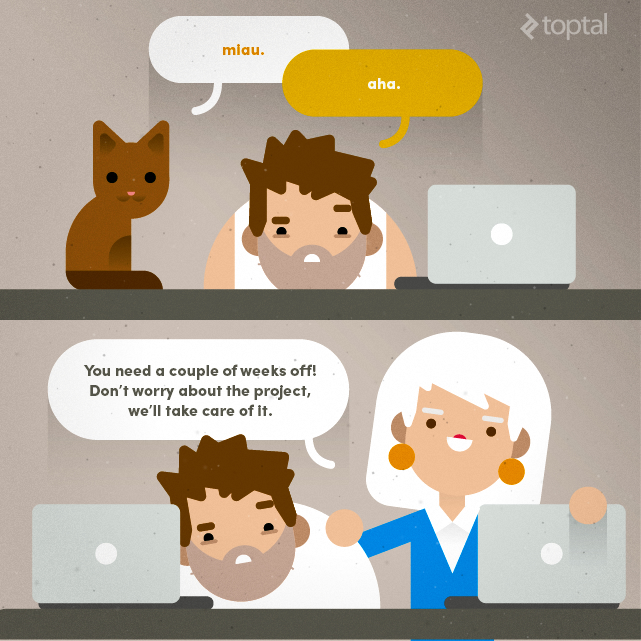
Another potential burnout issue for freelancers is that they can jump from project to project, client to client, in a matter of months. In that case, most of their communication will involve people who are unfamiliar with their personality. If you spent the last five years sharing an office with a couple of people, they’ll probably spot your burnout symptoms before you do. If your work involves a dozen remote clients each year, they will simply not get to know you well enough. Digital nomads and many on-site consultants have it even worse because they are not surrounded by friends and family who could help spot the problems.
There is not a lot of research on remote burnout, but I suspect people like us are exposed to more risk than office workers due to the fact that we may overlook many early symptoms.
So What Can Remote Workers Do?
I will not turn this into a blog post on how to tackle burnout. The Internet is already full of them; some are good, some aren’t, so if you need more information, feel free to Google them. Basically, they all boil down to this: take a break, work less, exercise more, and eat healthily.
The idea behind this post is to help fellow remote workers do the following:
- Be aware of burnout risks
- Spot the symptoms early on
- Take steps to avoid burnout
Burnout is real, and just because you haven’t experienced it yet, doesn’t mean you won’t. Sure, you can do 12- to 14-hour days, and you can work weekends, I did too, but you can’t do it forever. That’s how burnout got its name to begin with.
If however, you are aware of the risks, you need to be on the lookout for burnout symptoms. I already explained why this can be a lot more challenging for remote workers than office folk. That’s why I keep emphasising this vital step, so please forgive me if you think I am overdoing it.
In my opinion, prevention is the best course of action, and I really wish I read something like this post a few years ago, it would have saved me a lot of trouble and unnecessary visits to the doctor’s office, including one to the emergency room. My hubris landed me there, and I hope my experience keeps some of you out.

Here is what all of us can and should do to avoid burnout:
- Don’t put your social life on the backburner
- Take breaks and put them to good use
- Try to exercise more
- Create a routine that works for you
- Prioritise your work and your life
- Make sure you get quality time off
- Don’t be cocky and overconfident
- Be careful with caffeine, sugar, booze
Our social lives are the obvious starting point. We’re people, not lone wolves, it’s innate nature. Make sure your work does not get in the way of your social activities. No excuses, just don’t do it. Ever.
We spend hours glued to our computers every day, so it’s important to remind ourselves to get up and engage in some activities every now and then. A sedentary lifestyle is very bad for you. Go out for breakfast or coffee, go for short walks a few times a day, do some housekeeping. Do anything. On that note, I am off to fold my laundry.
Use your free time to exercise. You don’t have to hit the gym every other day, but you do have to walk around a lot to compensate for your sedentary lifestyle. Exercise also helps keep stress and anxiety at bay.
None of this is possible without a good routine. Find one that works for you and stick to it. Restrict most, if not all, your work to certain hours when you feel productive (for most people, it’s the morning). As odd as it may sound, consider some less efficient habits. When you head out to lunch, for example, don’t restrict yourself to places minutes away from your home or office; take the long route, create errands that will compel you to spend more time outdoors and get your mind off work.
Quality time means that you need to set clear boundaries. For some people, it’s no work after a certain time of day, while others may refuse to do any work over the weekend. Our office is anywhere we want it to be, but that doesn’t mean we have to be in it all the time.
Being overconfident and biting off more than you can chew is never a good idea. Like I said, my hubris was responsible for by burnout. I thought I could handle everything right until the moment I ended up in hospital. Be reasonable and take it easy.
Eating healthily is one thing we should all do, regardless of stress and burnout yet many of us don’t. An often overlooked problem involves stimulants, ranging from your morning coffee to your nightcap. A lot of stressed-out freelancers are hooked on caffeine, alcohol, and over the counter medications.
This brings me to the next point.
Things You Should Avoid
Caffeine is not harmless. It can cause problems if you overdo it. I am not suggesting you stop drinking your morning coffee, but if you drink a lot of caffeinated soft drinks, or energy drinks, it might be a time to slow down. They’re burnout fuel.
Caffeine, stress, and sugar are a bad mix; caffeine can make anxiety worse, mess up your digestive system, lead to more sweating, urination, and so on. Energy drinks are the worst offenders, although many of us enjoy them. They often contain loads of caffeine and loads of sugar, both of which can have nasty side-effects when combined with stress. And I won’t even waste time explaining why spicing up your morning coffee with a cigarette is bad. Remember folks, for every cigarette you smoke, God takes a minute of your life and gives it to Keith Richards.
What about a beer or two after work? There is nothing wrong with having a couple of beers or glasses of wine, especially if you get good stuff and enjoy this guilty pleasure over a nice meal. In fact, many medical experts find that moderate alcohol intake is good for you. However, if you are stressing out and on the verge of burnout, it’s not. Alcohol masks some of your burnout symptoms and lulls you into a sense of well-being.
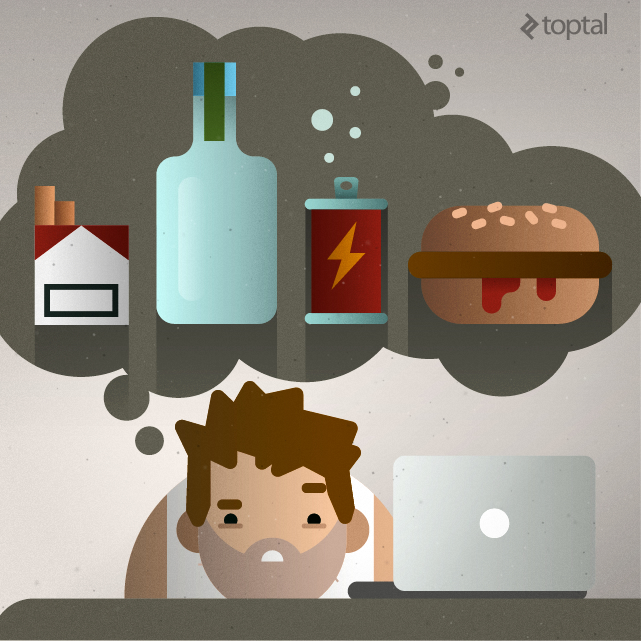
For the same reason, over-the-counter medications are not to be messed with either. These meds aren’t necessarily bad for you, but you should not self-medicate. Always consult an expert, just in case you have some underlying conditions, or if you are using happy pills as a crutch for something else.
Of course, the worst thing you can do when you are stressed is to abuse alcohol or prescription medications, which will just make things much worse in the long run. If you happen to live in Colorado, and you’re considering getting some recently legalised herbs, think again. In this situation, that’s bad for you too, and can cause nasty withdrawal symptoms if you are suffering from burnout, anxiety, depression, and a range of other conditions.
There are a lot of things to keep in mind, but in my opinion, the takeaway is simple: Be aware of the risks and take immediate action if you notice signs of burnout. Notify your superiors, your clients, consult your doctor, reach out to your friends, and take some quality time off.
That is what I intend to do next week, and that was one of the reasons I decided to cover this issue. Now I have a good excuse to head down to the beach.
